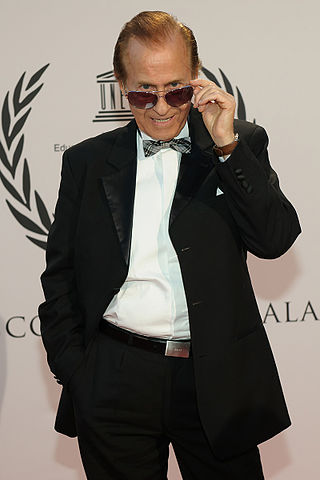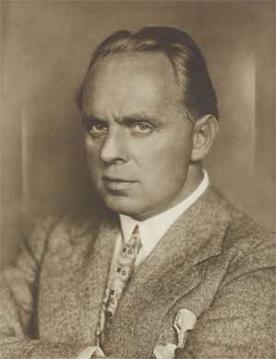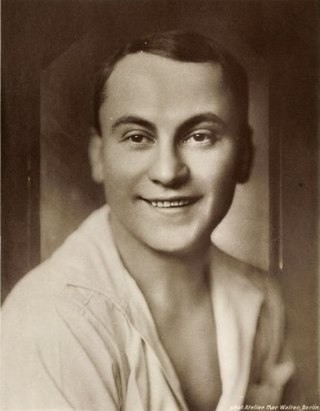Related Research Articles

Bruno Walter was a German-born conductor, pianist and composer. Born in Berlin, he escaped Nazi Germany in 1933, was naturalised as a French citizen in 1938, and settled in the United States in 1939. He worked closely with Gustav Mahler, whose music he helped to establish in the repertory, held major positions with the Leipzig Gewandhaus Orchestra, New York Philharmonic, Concertgebouw Orchestra, Salzburg Festival, Vienna State Opera, Bavarian State Opera, Staatsoper Unter den Linden and Deutsche Oper Berlin, among others, made recordings of historical and artistic significance, and is widely considered to be one of the great conductors of the 20th century.

Die Herzogin von Chicago is an operetta in two acts, a prologue, and an epilogue. The music was composed by Hungarian composer Emmerich Kálmán with a libretto by Julius Brammer and Alfred Grünwald. It premiered in Vienna at the Theater an der Wien on April 5, 1928, and played for 372 performances. The work was presented in out-of-town tryouts in Newark, New Jersey and Springfield, Massachusetts by the Shuberts in 1929, but it did not make it to Broadway. The piece was forgotten until 1997, when the Lubo Opera Company performed it in concert in New York, after which Light Opera Works of Illinois performed the work in 1998 in a fully staged version with a new translation by Philip Kraus and Gregory Opelka. In 1999, Richard Bonynge made a recording of the work, which revived international interest in it.

Michael Holm is a German singer, musician, songwriter and record producer. He is primarily known as a singer of Schlager music. Although his first appearance in the hit parade was in 1962, he had his first big hit in 1969. "Mendocino", the German adaptation of a song by the Sir Douglas Quintet, was the biggest selling single that year in (Germany). The record was released in September 1969, reached number three for five weeks, selling over a million copies. Ariola presented him with a gold record in October 1970.
Wolfgang Georg Louis Liebeneiner was a German actor, film director and theatre director.
Paul Joseph Verhoeven was a German actor as well as a film and theatre director.

Friedrich Rudolf Klein, better known as Rudolf Klein-Rogge, was a German film actor, best known for playing sinister figures in films in the 1920s and 1930s as well as being a mainstay in director Fritz Lang's Weimar-era films. He is probably best known in popular culture, particularly to English-speaking audiences, for playing the archetypal mad scientist role of C. A. Rotwang in Lang's Metropolis and as the criminal genius Doctor Mabuse. Klein-Rogge also appeared in several important French films in the late 1920s and early 1930s.
Die Flippers were a German Schlager group formed in 1964. They were one of the most successful Schlager groups of all time, and have been constantly recording and releasing new music since their self-titled debut album was released in 1970. They have released 45 albums, 5 of which have gone platinum, 24 gold. They have won 11 Goldene Stimmgabel awards in 1988, 1991, 1994, 1995, 1996, 1998, 1999, 2000, 2002, 2003 and 2004.

Erika Pluhar is an actress, singer and author from Austria and was born on 28 February 1939 in Vienna.
Edmund Nick was a German composer, conductor, and music writer.

Theo Lingen, born Franz Theodor Schmitz, was a German actor, film director and screenwriter. He appeared in more than 230 films between 1929 and 1978, and directed 21 films between 1936 and 1960.

Hubert "Hubsi" von Meyerinck was a German film actor. He appeared in more than 280 films between 1921 and 1970.

Kurt Vespermann was a German stage and film actor.

Rudolf Bernauer was an Austrian lyricist, librettist, screenwriter, film director, producer, and actor.

Erik Martin was a German writer, songwriter and composer of songs. He was the founder and editor of the literature and art magazine Muschelhaufen.
Gerhard Max Richard Bienert was a German stage and film actor.
Emil Rameau was a German film and theatre actor, and for many years the deputy artistic director at the Schiller Theater. He appeared in nearly 100 films between 1915 and 1949.

The Court Concert is a 1936 German historical romantic comedy film directed by Detlef Sierck, and starring Mártha Eggerth, Johannes Heesters, and Kurt Meisel. It was made by the largest German studio UFA, based on Das kleine Hofkonzert. It is part of a group of operetta films made during the 1930s. The film was made at the Babelsberg Studios in Berlin with sets designed by the art director Fritz Maurischat. A separate French-language version was also made.

The Court Concert is a 1948 German musical comedy film written and directed by Paul Verhoeven and starring Elfie Mayerhofer, Hans Nielsen and Erich Ponto. In the United States it was released as Palace Scandal.
Renate Holm was a German-Austrian film actress and operatic soprano. She worked as a dentists' assistant and took private singing lessons, resulting in performances in musical films and schlager. She made her debut at the Vienna Volksoper in 1957, and moved on to the Vienna State Opera where she worked for decades. She appeared internationally and made many recordings, especially for the WDR in a series of operettas with conductor Franz Marszalek. She later worked as a voice teacher, juror at competitions, and festival manager. Her memoir was published in 2017.
Otto Ebel von Sosen was a German musician, conductor and composer.
References
- ↑ "Das kleine Hofkonzert (details and brief synopsis, print version)" (in German). Felix Bloch Erben Verlag. Retrieved 19 October 2007.
- ↑ ASIN B000024QR8 , Fantasie (Disc 2, track 4)
- Reclams Operettenführer, Anton Würz (ed.), Stuttgart 1962